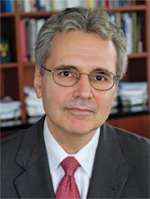Ronald A. DePinho
| Ronald A. DePinho | |
|---|---|
 | |
| Alma mater | |
| Scientific career | |
| Institutions | |
Ronald A. DePinho, was the fourth president of the University of Texas MD Anderson Cancer Center in Houston and is internationally recognized for basic and translational research in cancer, aging and age-associated degenerative disorders. He was inducted into the National Academy of Sciences in 2012.
DePinho assumed the presidency at MD Anderson on Sept. 1, 2011.[1] He was only the fourth full-time president in the 70-year history of MD Anderson.[2] He announced his resignation on March 8, 2017, after scrutiny over the administration of the organization had put him in the spotlight, and remained through the end of the 85th Texas Legislative Session.[3][4]
Prior to joining MD Anderson, he spent 14 years at Dana-Farber Cancer Institute and Harvard Medical School in Boston. There, he was founding director of the Belfer Institute for Applied Cancer Science at Dana-Farber and was a professor in the Department of Medicine (genetics) at Harvard and an American Cancer Society Research Professor. Previously, he held numerous faculty positions during 10 years at Albert Einstein College of Medicine in New York. DePinho is married to noted cancer geneticist, Lynda Chin and has three children, Alexis, Carolyn, and Joseph DePinho.
Research
At Dana-Farber and Harvard, DePinho guided major basic-translational research programs focused on brain, colorectal, pancreatic and prostate cancers. Under his leadership, the Belfer Institute followed industry-like principles to systematically translate basic research findings into clinical endpoints.
His scientific program has made fundamental discoveries underlying cancer in the aged and factors governing acquired and inherited degenerative disorders. He established the concept of tumor maintenance, discovered a core pathway of aging and demonstrated that aging is a reversible process.[5] He has constructed and used refined mouse models of cancer to identify many new cancer targets and diagnostics.
Background
DePinho was born in the Bronx, NY in 1955 to Celeste and Alvaro DePinho. He is the third of five children. He earned a bachelor's degree in biological sciences in 1977 from Fordham University, where he graduated summa cum laude as class salutatorian. He received his medical degree with distinction in microbiology and immunology in 1981 from Albert Einstein College of Medicine.
He completed an internship and residency in internal medicine at Columbia-Presbyterian Medical Center, followed by postdoctoral fellowships in the Department of Cell Biology at Albert Einstein College of Medicine and in the Department of Biochemistry and Biophysics at Columbia-Presbyterian Medical Center.
DePinho's independent scientific career began at Albert Einstein College of Medicine, where he was the Feinberg Senior Scholar in Cancer Research. There, he established the first National Cancer Institute-supported shared transgenic and gene targeting facility, which enabled his laboratory and many other researchers to model and study the genetic basis of cancer and other complex diseases.
Honors

Awards
- American Italian Cancer Foundation Prize for Scientific Excellence in Medicine, 2012
- Member, National Academy of Sciences (2012)
- Fellow, American Academy of Arts and Sciences (2010)
- Albert Szent-Gyrgyi Prize for Progress in Cancer Research (2009)
- Helsinki Medal (2007)
- Albert Einstein College of Medicine Distinguished Alumnus Award (2004)
- American Cancer Society Edith A. Pistorino Research Professorship (2004)
- Member, Institute of Medicine of the National Academies (2004)
- AACR-G.H.A. Clowes Memorial Award (2003)
- American Society for Clinical Investigation Award (2002)
- American Society for Clinical Investigation Award (2000)
Select publications
- "Epigenetic Activation of WNT5A Drives Glioblastoma Stem Cell Differentiation and Invasive Growth".
- "Oncogene ablation-resistant pancreatic cancer cells depend on mitochondrial function". Nature. 514: 628–632. doi:10.1038/nature13611. PMC 4376130.
- "Glutamine supports pancreatic cancer growth through a KRAS-regulated metabolic pathway". Nature. 496: 101–105. doi:10.1038/nature12040.
- "Oncogenic Kras maintains pancreatic tumors through regulation of anabolic glucose metabolism".
- Paik, JH; Ding, Z; Narurkar, R; Ramkissoon, S; Muller, F; Kamoun, WS; Chae, SS; Zheng, H; Ying, H; Mahoney, J; Hiller, D; Jiang, S; Protopopov, A; Wong, WH; Chin, L; Ligon, KL; DePinho, RA (Nov 2009). "FoxOs cooperatively regulate diverse pathways governing neural stem cell homeostasis". Cell Stem Cell. 5 (5): 540–53. doi:10.1016/j.stem.2009.09.013.
- "p53 and Pten control neural and glioma stem/progenitor cell renewal and differentiation". Nature. 455: 1129–1133. doi:10.1038/nature07443. Retrieved Sep 1, 2011.
- Paik, JH; Kollipara, R; Chu, G; Ji, H; Xiao, Y; Ding, Z; Miao, L; Tothova, Z; Horner, JW; Carrasco, DR; et al. (Jan 2007). "FoxOs are lineage-restricted redundant tumor suppressors and regulate endothelial cell homeostatsis". Cell. 128 (2): 309–23. doi:10.1016/j.cell.2006.12.029.
- "Chromosomally unstable mouse tumours have genomic alterations similar to diverse human cancers". Nature. 447: 966–971. doi:10.1038/nature05886. PMC 2714968. Retrieved Sep 1, 2011.
- Stommel, JM; Kimmelman, AC; Ying, H; Nabioullin, R; Ponugoti, AH; Wiedemeyer, R; Stegh, AH; Bradner, JE; Ligon, KL; Brennan, C; et al. (Oct 2007). "Coactivation of receptor tyrosine kinases affects the response of tumor cells to targeted therapies". Science. 318 (5848): 287–90. doi:10.1126/science.1142946.
- "Telomere dysfunction and Atm deficiency compromises organ homeostasis and accelerates aging". Nature. 421: 643–648. doi:10.1038/nature01385. Retrieved Sep 1, 2011.
References
- ↑ "Incoming MD Anderson chief sets challenge for institution". The Houston Chronicle. Retrieved Sep 1, 2011.
- ↑ "MD Anderson's Past Presidents". The University of Texas MD Anderson Cancer Center. Retrieved Sep 1, 2011.
- ↑ https://www.mdanderson.org/newsroom/2017/03/-change-in-leadership-at-md-anderson.html
- ↑ https://www.statnews.com/2017/03/08/md-anderson-depinho-resigns/
- ↑ "Partial reversal of aging achieved in mice". Harvard Gazette. Retrieved Sep 1, 2011.
- ↑ "Cidadãos Estrangeiros Agraciados com Ordens Portuguesas". Página Oficial das Ordens Honoríficas Portuguesas. Retrieved 29 January 2017.